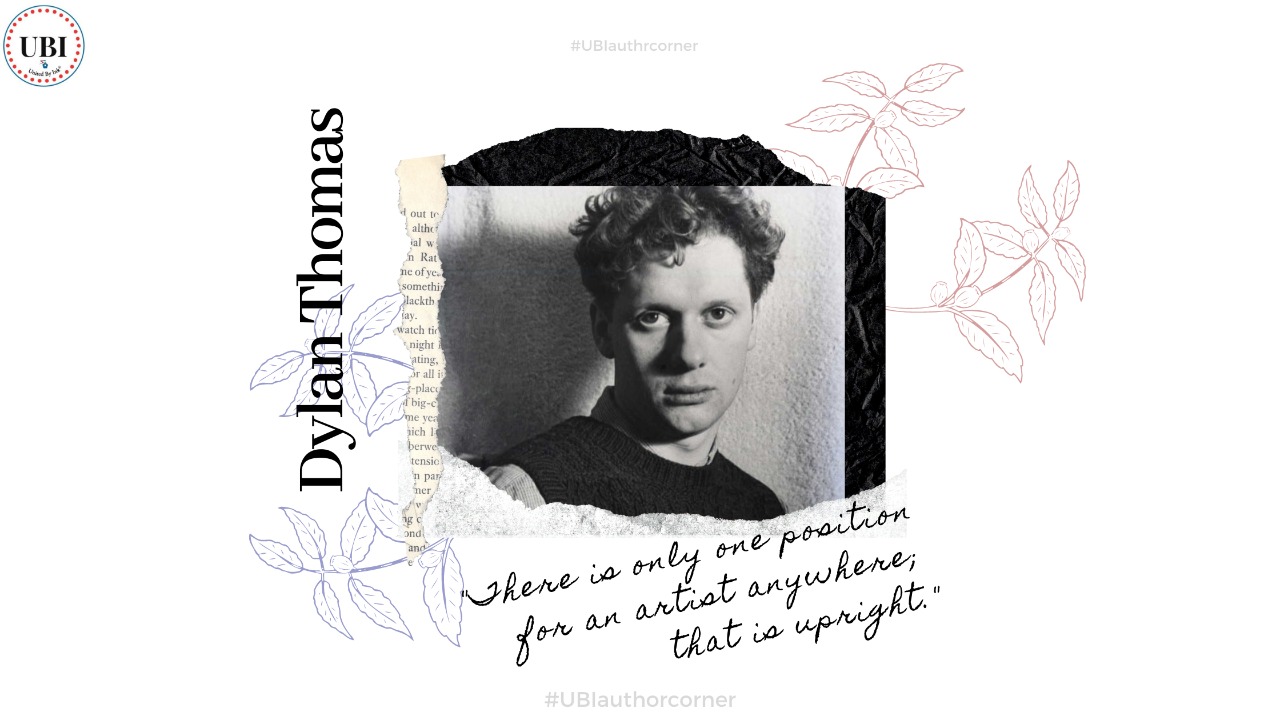
UBI celebrates Dylan Thomas’s birth anniversary on today’s author corner. Read below about his life and writing style!
Full name – Dylan Marlais Thomas
Death – 1953, age 39
Nationality – Welsh
” These poems, with all their crudities, doubts, and confusions, are written for the love of Man and in praise of God, and I’d be a damn’ fool if they weren’t. “
– Dylan Thomas
Thomas is arguably the most well-known Welsh poet of all time, paradoxically his literary work is written entirely in English. Many of Dylan’s poems drew from these childhood experiences of the rural Welsh countryside and he began writing of them in his notebooks at the age of 15. A prominent poet of the 20th century, his most famous poem, “Do Not Go Gentle Into That Good Night,” was published in 1952, but his reputation was solidified years earlier.
Early life and education –
Thomas spent his childhood in Southwestern Wales. His father taught English at the Swansea grammar school, which in due course the boy attended. Because Dylan’s mother was a farmer’s daughter, he had a country home he could go to when on holiday. His poem “Fern Hill” (1946) describes its joys and what that place meant to him.
Although he edited the school magazine, contributing poems and prose to it, Thomas did badly at school since he was always intellectually lazy with regard to any subject that did not directly concern him. However, his practical knowledge of English poetry was enormous and had begun writing poems at a very early age. Scholars have shown that the bulk of his poetic output was completed, at least in embryonic form, by the time he moved to London at the age of 21. At age 16 he left school to work as a reporter on the South Wales Evening Post. Thomas basically made London his home for some 10 years from about 1936 and within that time period, he had become famous in literary circles.
Writing –
Thomas’s work, in its overtly emotional impact, its insistence on the importance of sound and rhythm, its primitivism, and the tensions between its biblical echoes and its sexual imagery, owed more to his Welsh background than to the prevailing taste in English literature for grim social commentary. Therein lay its originality. The poetry written up to 1939 is concerned with introspective, obsessive, sexual, and religious currents of feeling; and Thomas seems to be arguing rhetorically with himself on the subjects of sex and death, sin and redemption, the natural processes, creation and decay. The writing shows prodigious energy, but the final effect is sometimes obscure or diffuse.
Career and personal endeavours –
In 1934, when Thomas was twenty, he moved to London, won the Poet’s Corner book prize, and published his first book, 18 Poems (The Fortune press), to great acclaim. The book drew from a collection of poetry notebooks that Thomas had written years earlier, as would many of his most popular books. Unlike his contemporaries, T.S Eliot and W. H. Auden, Thomas was not concerned with exhibiting themes of social and intellectual issues, and his writing, with its intense lyricism and highly charged emotion, had more in common with the Romantic tradition.
Two years after the publication of 18 Poems, Thomas met the dancer Caitlin Macnamara at a pub in London. At the time, she was the mistress of painter Augustus John. Macnamara and Thomas engaged in an affair and married in 1937. In 1940, Thomas and his wife moved to London. He had served as an anti-aircraft gunner but was rejected for more active combat due to illness. To avoid the air raids, the couple left London in 1944. They eventually settled at Laugharne, in the Boat House where Thomas would write many of his later poems.
Thomas avoided service in World War II because of medical problems mentioned above, he had also considered filing for conscientious objector status. He was able to secure employment during the war years writing documentary scripts for the British Broadcasting Corporation (BBC). While he considered it hack work, it provided the first regular income since his newspaper days and also allowed him to spend a good deal of time in London pubs. This pragmatic writing was the beginning of a career that Thomas pursued until his death; it did not, however, replace what he considered his more important work, the writing of poems. In addition to the documentaries, he wrote radio scripts and eventually screenplays for feature films. Though his income from these activities was moderate, it did not allow him relief from debt or borrowing.
In 1947 Thomas was awarded a Traveling Scholarship from the Society of Authors. He took his family to Italy, and while in Florence, he wrote In Country Sleep, And Other Poems (Dent, 1952), which includes his most famous poem, “Do not go gentle into that good night” When they returned to Oxfordshire, Thomas began work on three film scripts for Gainsborough Films. The company soon went bankrupt, but Thomas’s scripts, “Me and My Bike,” “Rebecca’s Daughters,” and “The Beach at Falesa,” were made into films. They were later collected in Dylan Thomas: The Filmscripts (JM Dent & Sons, 1995).
His reading tours in the United States did much to popularize poetry reading as a new medium for art. Because of this, Thomas toured America four times, with his last public engagement taking place at the City College of New York. A few days later, he collapsed in the Chelsea Hotel after a long drinking night. On November 9, 1953, he died at St. Vincent’s Hospital in New York City at the age of thirty-nine.
While there are times when the often embellished tales of Dylan’s tempestuous relationship with both Caitlin and alcohol have threatened to overshadow the achievements of his literary work, today it is an indisputable fact that Dylan has gone into history as one of Wales’ most celebrated sons. He had become a legendary figure, both for his work and the boisterousness of his life. He was buried in Laugharne, and almost thirty years later, a plaque to Dylan was unveiled in the Poet’s Corner of Westminster Abbey.
How useful was this post?
Click on a star to rate it!
Average rating 1 / 5. Vote count: 3
No votes so far! Be the first to rate this post.

UBI stands for United By Ink®️. UBI is a Global Platform- the real-time social media interactive forum created for Readers, Writers and Facilitators alike.This platform aims to help creative souls realize their writing goals.
Click on our representatives below to chat on WhatsApp or send us an email to ubi.unitedbyink@gmail.com
